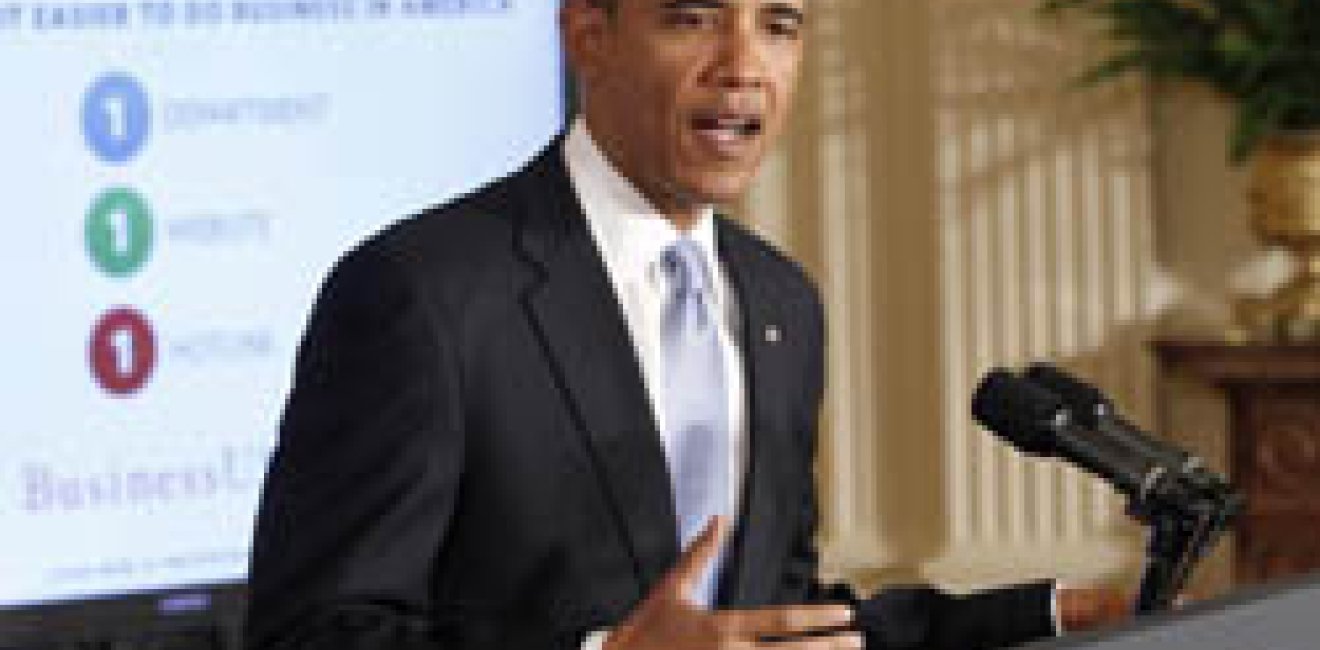Will Obama Move Help Small Businesses?
Small business is not to be trifled with. President Barack Obama's announcement last week of a proposal to temporarily elevate the Small Business Administration to Cabinet rank is a move in the right direction.
Small business is not to be trifled with. President Barack Obama's announcement last week of a proposal to temporarily elevate the Small Business Administration to Cabinet rank is a move in the right direction.

Small business is not to be trifled with. President Barack Obama's announcement last week of a proposal to temporarily elevate the Small Business Administration to Cabinet rank is a move in the right direction.
In the United States, we know that firms less than 5 years old create the vast majority of net new jobs. It is mom and pop shops, garage start-ups and fledgling companies with good ideas that generate growth.
The president's move appears to reflect the importance of entrepreneurial companies to the U.S. economy.
But his announcement came with a mixed signal. The president gave SBA Cabinet ranking at the same time that he proposed merging six government agencies into one department focused on commerce and trade. Is the political theater in an election year? Because actual policy to support small business growth matters much more, particularly since the engine of small business growth is not what it used to be.
In 2011, the Small Business Administration provided a record $30.5 billion in loan guarantees. Access to credit is critical to fledgling companies, and the SBA stepped in to help.
Over the past few years, companies are starting smaller and staying smaller. Kauffman data show that U.S. firms have generated around 3 million new jobs each year historically, but starting in 2009, similar cohorts created only 2.3 million jobs. And, firms are originating with small teams. In the 1990s, new firms started with about 7.5 jobs on average compared with 4.9 jobs today.
What happens when small businesses launch but don't "scale?" We are left with an economy short of 13.1 million jobs.
It is an urgent national priority to help small firms grow. This is of much greater importance than Cabinet reshuffling. And while a presidential announcement gives the appearance of focus, it doesn't guarantee legitimate change.
Today, U.S. businesses are constrained by burdensome regulation related to health care, the Dodd-Frank financial reform act of 2010, labor issues and environmental issues. Political as well as economic uncertainty makes it difficult for business owners to hire for future growth.
In December, the economy added 200,000 jobs, and the jobless rate fell to 8.5%. To accelerate recovery, we must further remove impediments for small businesses to perform.
The good news is that 2012 started with an economic uptick. In December, the economy added 200,000 jobs, and the jobless rate fell to 8.5%. To accelerate recovery, we must further remove impediments for small businesses to perform.
Small and new companies require key policy changes to jump-start growth. We need visa reform to welcome foreign-born entrepreneurs who have graduated from U.S. universities and who want to create new enterprises here. We need to advance trade and further open global markets for U.S. goods. Ninety-five percent of the people we want to sell to live outside of the United States.
We need to strengthen K-12 education and improve training programs to ready our work force for the jobs of the future. Further, we need comprehensive tax reform to encourage the creation of new businesses. We cannot continue to maintain one of the highest corporate tax rates in the world and expect entrepreneurs and investors to not move abroad.
A new Chamber of Commerce survey reports that more than 80% of small-business owners worry about the prospect of new regulations, mandates and higher taxes. An onslaught of regulations and taxes stymies small firms.
Still, America is home to more than 25 million small businesses and entrepreneurs. Despite setbacks, these innovators continue to persevere. In 2011, the Small Business Administration provided a record $30.5 billion in loan guarantees. Access to credit is critical to fledgling companies, and the SBA stepped in to help.
What does it mean if, as Obama proposed in his news conference, that the Commerce Department's core functions will be coalesced with those of the Office of the U.S. Trade Representative, the Export-Import Bank, the Overseas Private Investment Corporation, the Trade and Development Agency and the Small Business Administration. If this reorganization occurs, the SBA will immediately lose its newly awarded Cabinet rank.
So which is it? Is Obama genuinely elevating the SBA or seeking to integrate it into a larger bureaucracy? The president's message raises questions about the White House's true commitment to small business concerns.
In an election year, politicians pay lip service to topics that pull at America's heartstrings. Small business does something more important: It quickens the nation's pulse. 2012 is a year for urgent action on the economy. Small business matters not only for political headlines, it is our best hope for putting America back to work.
This article was first published on CNN.
